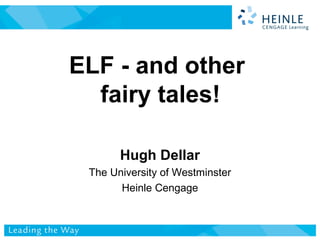E L F And Other Fairy Tales
- 1. ELF - and other fairy tales! Hugh Dellar The University of Westminster Heinle Cengage
- 2. Your surnameŌĆÖs Jones, isnŌĆÖt it? > Yes, it is. And youŌĆÖre 27, arenŌĆÖt you? > Yes, thatŌĆÖs right. You werenŌĆÖt at home last night at 8, were you? > No, I wasnŌĆÖt. I was at the pub. But you donŌĆÖt have any witnesses, do you? > Yes, I do. My brother was with me. Your brother wasnŌĆÖt with you, was he? > How do you know? Because he was at the police station. We arrested him last night. Native speaker dominance?
- 3. It must be very strange to be back home after such a long time. > Yes, it is. I ŌĆ” I mean, itŌĆÖs lovely to see everybody and I really appreciate my bed. LetŌĆÖs have a look at these photos, then. > Well, theyŌĆÖre all mixed up at the moment. IŌĆÖve got to sort them out. Um, this looks nice. Where is it? > Where do you think it is? Ah, well ŌĆ” it must be somewhere really hot. It looks like paradise. I suppose it could be Thailand or Bali, or it could even be India. > No. IŌĆÖll give you a clue. ItŌĆÖs an island in the Pacific Ocean. Hawaii. ’āś No, I didnŌĆÖt go to Hawaii. Oh right. I thought youŌĆÖd been everywhere. ItŌĆÖs probably Fiji, then. Native speaker dominance?
- 4. 1 Andy Kirkpatrick and /th/ 2 ŌĆ£In international contexts, the simpler, the betterŌĆØ! 3 Doublespeak: good, ungood, plusgood, doubleplusgood 4 Jennifer Jenkins: ŌĆ£I like chilling out.ŌĆØ 5 Luke Prodromou and the corpora of non- native-speaker English The backwash
- 5. Excuse me. Is there an ATM machine near here? ’āś Please? A cash machine? To get money? ’āś Sorry. I no English. Money? ’āś Oh! Yes! Yes!! Go there. Meanwhile ŌĆ” back in the real world!
- 6. 1 The reductionism of ELF-ers. Great / boiling / Do you mind if I ŌĆ”? / I canŌĆÖt stand it /I love it / spare time-key- room /unemployed 2 We assume competence - to avoid being patronising! 3 We can all accommodate ourselves - and grade down. 4 The concept of ŌĆśnative-likeŌĆÖ is all relative . . . and depends on L1. The can of worms!
- 7. 5 Students themselves often seek out ŌĆśnative-likeŌĆÖ language. How long your tail! / Were you born in a barn? / I felt like a fish out of water. 6 Students also often translate expressions directly. Do you think I have cucumbers on my eyes? / Do you think I was born yesterday? 7 Are we stifling creativity? He drinks like a horse/I felt like a fish IN the water/I felt like a bird out of the sky. 8 Level! Further complications . . .
- 8. ŌĆó Just because many conversations are between non- natives, it doesnŌĆÖt mean people wonŌĆÖt also talk to natives. ŌĆó Many non-natives already speak near-native level English. ŌĆó Whose ELF is it anyway? ŌĆó What students really want. ŌĆó Ebonics and similar debates. The issue of models
- 9. ŌĆó Jennifer Jenkins and ELF pronunciation ŌĆó Barbara Seidlhofer and grammatical errors which do not hinder communication: Dropping the 3rd. person -s/who and which/tag questions/redundant prepositions ŌĆó Collocational errors The environment is a large theme in my thesis. ŌĆó Talking like me doesnŌĆÖt mean being me! ŌĆó Are ELF-ers just opposed to bad teaching? Is comprehensibility enough?
- 10. ŌĆó Native-like does not mean NATIVE. ŌĆó Reuseability is central ŌĆó Teaching standards doesnŌĆÖt mean IMPOSING them. ŌĆó Knowledge is power. ŌĆó Language teachers teach language. In conclusion
- 11. Visit the Heinle stand and claim a free book! E-mail me at: hughdellar@mac.com










